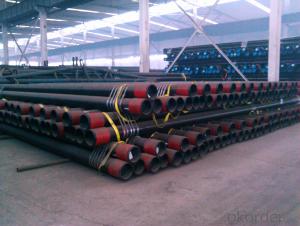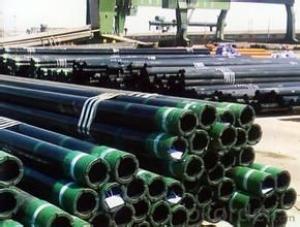API 5CT L80 Casing And Tubing Pipe in China
- Loading Port:
- Shanghai
- Payment Terms:
- TT OR LC
- Min Order Qty:
- 10 m.t.
- Supply Capability:
- 100000 m.t./month
OKorder Service Pledge
OKorder Financial Service
You Might Also Like
1,Tubing:60.3mm-114.3mm
2,Casing:114.3mm-508mm,
3,Coupling:60.3mm-508mm
4,pup joints:60.3mm-114.3mm
5,seamless steel pipe:89mm-273mm
API 5CT L80 Casing And Tubing Pipe
Product | Oil Casing Pipe | ||
O.D | 139~273mm | W.T | 3.68~16.13mm |
Length | 1-12M , according to customers' requirements | ||
Standard | ASTM A106,ASTM A53,API 5L,API 5CT | ||
Material | H40,J55,K55,N80,L80,P110,Q235B,Q345B GRB/X42/X46/X52/X56/X60/X65/X70/X100 | ||
Inspection | X-ray inspection,manual ultrasonic inspection,surface inspection, hydraulic testing,ultrasonic detection | ||
Technique | Cold drawn,Hot rolled,heat extrusion | ||
Certifications | 1.API Spec 5L & API Spec 5CT certificates; 2.ISO9001:2000 International Quality System certificate; 3.ISO14001:2004 Environmental Management System certificate | ||
Usage | 1.water,petroleum,natural gas transportation 2. Aerospace,shipbuilding, automobile manufacturing 3.boiler,coal,chemicals | ||
Main market | USA,Middle east,South America,Europe,Southeast Asia,Australia,Africa | ||
Productivity | 5000Tons/Month | ||
Packing | Plastic caps, bundle, black painting,3PE or negotiation | ||
Remarks | 1)Payment terms : T/T,L/C 2)Trade Terms : FOB / CFR /CIF 3)Minimum quantity of order:10 MT 4)Delivery period :15-20 days after receiving deposit | ||
- Q:What are the disadvantages of using steel pipes?
- One disadvantage of using steel pipes is that they are prone to corrosion, especially in environments with high humidity or exposure to certain chemicals. This can lead to structural damage and reduced lifespan of the pipes. Additionally, steel pipes are relatively heavy and bulky, making transportation and installation more challenging compared to other pipe materials. Lastly, steel pipes can be more expensive than alternative materials, which can impact project budgets.
- Q:How are steel pipes used in the automotive exhaust system?
- Steel pipes are used in the automotive exhaust system to transport and direct the flow of exhaust gases from the engine to the rear of the vehicle. These pipes are durable, heat-resistant, and corrosion-resistant, making them suitable for withstanding the high temperatures and harsh conditions of the exhaust system. Additionally, they help reduce noise and emissions by providing a pathway for the gases to exit the vehicle efficiently.
- Q:Can steel pipes be used for transporting hazardous materials?
- Yes, steel pipes can be used for transporting hazardous materials. Steel is highly durable and can withstand the pressure and temperature requirements of hazardous material transportation. Additionally, steel pipes can provide a reliable barrier against leaks and spills, minimizing the risk of environmental contamination. However, it is essential to consider the specific properties and compatibility of the hazardous material being transported to ensure the steel pipes are suitable for the task.
- Q:How to calculate the maximum bending stress of steel pipe? Is there a list of the maximum flexural normal stresses for steel pipes of different materials and diameters?
- The maximum flexural normal stress is calculated as: Sigma =M/ (gamma x*Wnx).Of which: M is the maximum bending moment of the steel tube;Gamma X - the plastic development coefficient of the cross section; for the cross section of the steel tube, 1.15,
- Q:How are steel pipes used in the construction of power transmission lines?
- Steel pipes are commonly used in the construction of power transmission lines due to their exceptional strength, durability, and versatility. These pipes serve various purposes throughout the project, contributing to the overall efficiency and reliability of the power transmission system. One primary application of steel pipes in power transmission line construction is for the installation of transmission towers. These pipes are used as structural components to support the transmission lines and maintain their alignment. The high strength of steel ensures that the towers can withstand the weight of the transmission lines, as well as external forces such as wind and ice loads. Moreover, steel pipes offer excellent resistance against corrosion, which is crucial for the longevity of the transmission tower structures. In addition to tower construction, steel pipes are also utilized for the underground transmission lines. These pipes act as conduits for the cables, protecting them from external elements and potential damage. Steel pipes are particularly advantageous in this application due to their ability to resist soil movement, withstand high pressure, and provide a secure pathway for the power cables. Furthermore, the durability of steel ensures the integrity and longevity of the underground transmission lines, reducing maintenance requirements and enhancing the overall reliability of the power transmission system. Furthermore, steel pipes are used for the construction of foundations and anchors for transmission towers. These pipes are driven deep into the ground to provide stability and support to the towers. The inherent strength and rigidity of steel pipes make them ideal for this purpose, as they can withstand the heavy loads and ensure the stability of the transmission towers even in adverse weather conditions. Overall, steel pipes play a crucial role in the construction of power transmission lines by providing structural support, protecting cables, and ensuring the overall reliability and efficiency of the transmission system. Their exceptional strength, durability, and resistance to corrosion make steel pipes an ideal choice for power transmission line construction projects.
- Q:What are the factors affecting the cost of steel pipes?
- There are several factors that can affect the cost of steel pipes. Some of the main factors include the price of raw materials, such as iron ore and coal, which are used in the steel manufacturing process. Additionally, the cost of labor, transportation, and energy can also impact the overall cost of steel pipes. Market demand and competition within the industry can also influence prices. Finally, factors such as government regulations, trade policies, and currency exchange rates can also play a role in determining the cost of steel pipes.
- Q:How are steel pipes protected against soil movement?
- Steel pipes are protected against soil movement through various methods such as using casing pipes, employing anchor systems, implementing protective coatings, and utilizing concrete thrust blocks. These measures ensure that the steel pipes remain stable and secure in the event of soil movement.
- Q:Can steel pipes be used for roller coaster tracks?
- Yes, steel pipes can be used for roller coaster tracks. In fact, they are one of the most common materials used for roller coaster tracks due to their strength, durability, and versatility. Steel pipes provide excellent support and stability for the roller coaster cars, ensuring a safe and thrilling ride experience for passengers. Additionally, steel pipes can be easily shaped and welded to create various track designs, including loops, twists, and turns, making them ideal for creating exhilarating roller coaster layouts. Furthermore, steel pipes are resistant to corrosion and can withstand harsh weather conditions, making them a reliable choice for outdoor roller coasters. Overall, steel pipes are a popular and reliable choice for roller coaster tracks, offering both safety and excitement for riders.
- Q:Can steel pipes be used for solar power systems?
- Indeed, solar power systems can utilize steel pipes. In the realm of solar power systems, steel pipes find widespread usage in diverse applications such as constructing support structures, mounting systems, and piping systems for circulating heat transfer fluids. The reason behind the preference for steel pipes lies in their robustness, longevity, and ability to withstand various environmental conditions. These pipes possess the capability to bear the weight of solar panels and support structures, as well as endure the impact of wind and other external elements. Moreover, steel pipes can be easily tailored and welded to cater to specific project requirements. All in all, when it comes to solar power systems, steel pipes emerge as a dependable and cost-efficient alternative.
- Q:Do steel pipes expand or contract with temperature changes?
- Steel pipes expand with temperature increases and contract with temperature decreases.
1. Manufacturer Overview |
|
|---|---|
| Location | |
| Year Established | |
| Annual Output Value | |
| Main Markets | |
| Company Certifications | |
2. Manufacturer Certificates |
|
|---|---|
| a) Certification Name | |
| Range | |
| Reference | |
| Validity Period | |
3. Manufacturer Capability |
|
|---|---|
| a)Trade Capacity | |
| Nearest Port | |
| Export Percentage | |
| No.of Employees in Trade Department | |
| Language Spoken: | |
| b)Factory Information | |
| Factory Size: | |
| No. of Production Lines | |
| Contract Manufacturing | |
| Product Price Range | |
Send your message to us
API 5CT L80 Casing And Tubing Pipe in China
- Loading Port:
- Shanghai
- Payment Terms:
- TT OR LC
- Min Order Qty:
- 10 m.t.
- Supply Capability:
- 100000 m.t./month
OKorder Service Pledge
OKorder Financial Service
Similar products
New products
Hot products
Related keywords






























